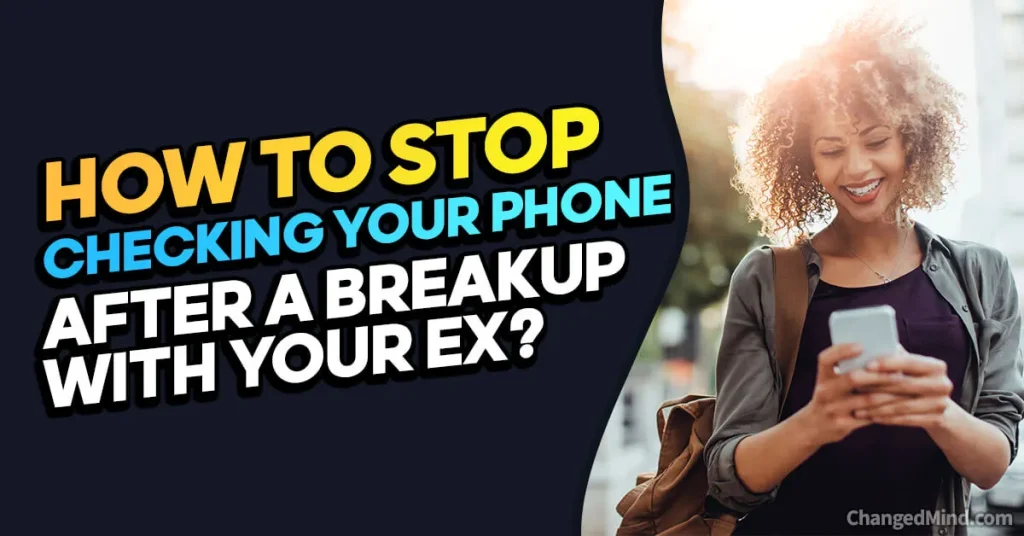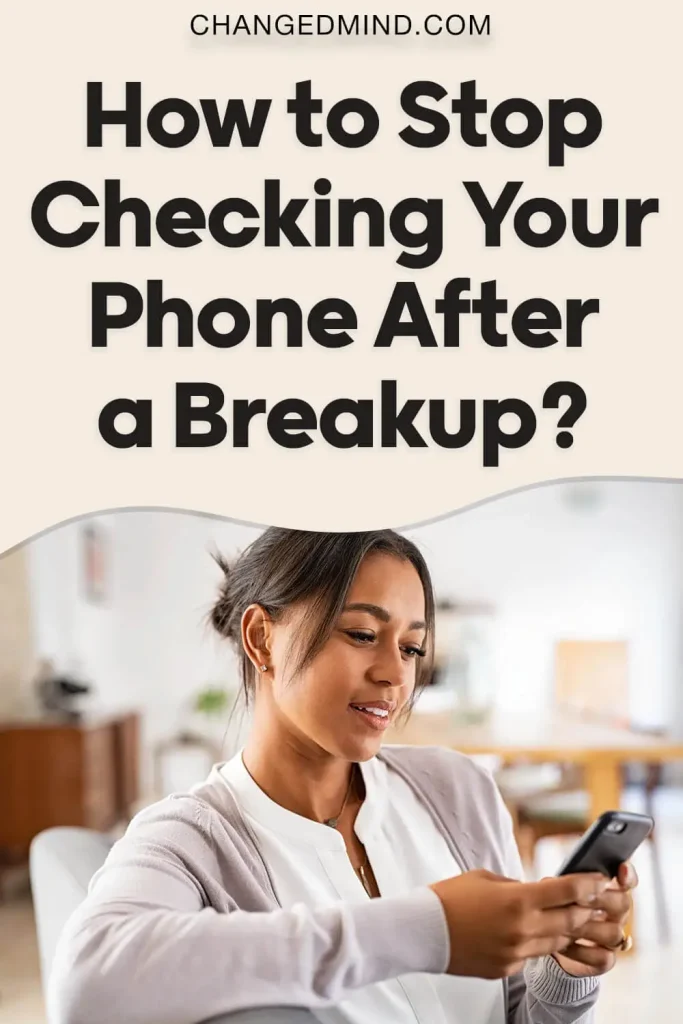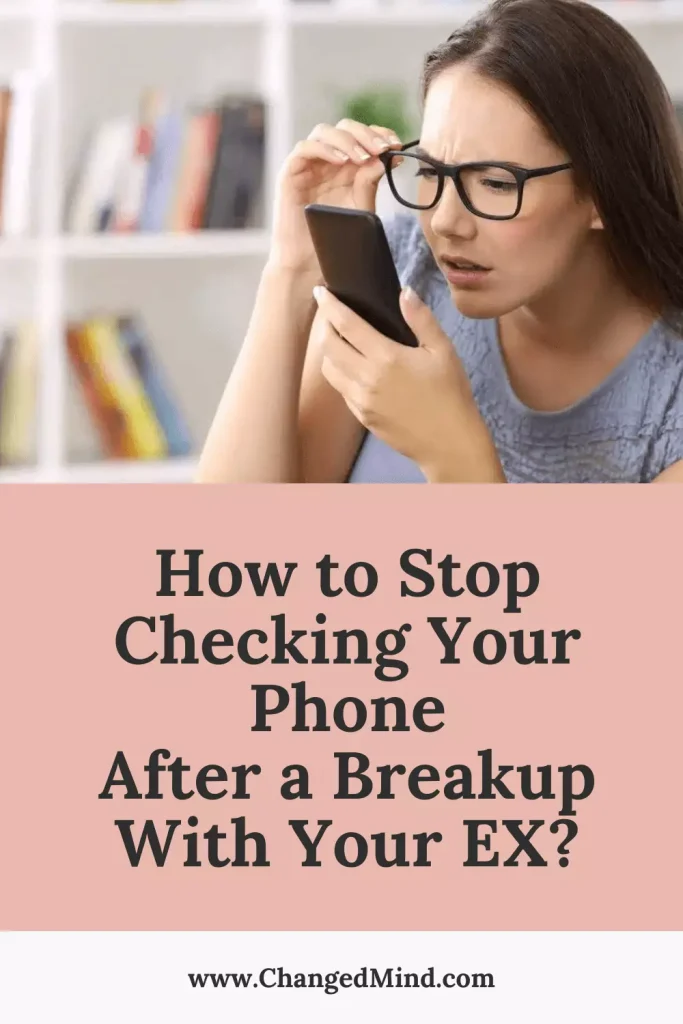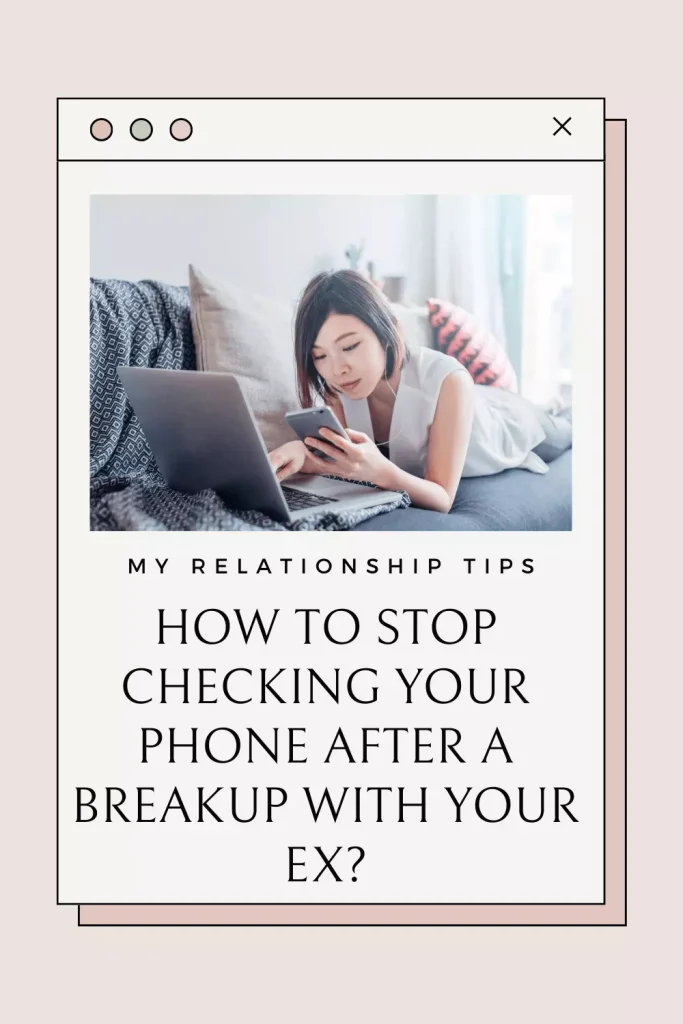Breakups are like the ultimate ‘Unsubscribe’ button in real life, but here’s the thing – the notifications don’t stop! 📱💔
So, how do you resist the urge to constantly check your phone after parting ways with your EX? It’s a question that’s all too relatable, and in this article, we’re diving headfirst into the digital detox post-breakup.
From mastering the art of distraction to finding healthier outlets for those incessant pings, we’ve got you covered.
In this article, you’ll discover:
- The psychology behind post-breakup phone addiction
- Creative ways to curb the phone-checking habit
- How to set healthy digital boundaries
- Tips for rediscovering your independence
- And much more! So, let’s unplug, heal, and take control! 💪📵
Breaking up with someone can be emotionally challenging, and it often leads to changes in behavior and routines. One aspect that significantly gets affected is our phone usage. The constant checking of our phones for messages, updates, or reminders from our ex can become a compulsive habit.

Understanding the impact of breakups on phone usage and the importance of limiting it after a breakup is crucial for our emotional well-being and growth.
Here, we will explore why breakups can lead to excessive phone checking, the significance of moving on and focusing on healing, and provide practical tips to stop checking your phone after a breakup.
By reducing phone usage, we can experience improved emotional well-being, enhanced self-esteem and confidence, increased focus on self-growth, and the opportunity to build stronger connections offline.
Key takeaway:
- The impact of breakups on phone usage: Breakups can lead to excessive phone checking as individuals seek distraction and validation.
- Tips to stop checking your phone after a breakup: Recognize and acknowledge your feelings, limit phone access, find alternative distractions, engage in healthy coping mechanisms, seek support from loved ones, and establish boundaries with your ex.
- Benefits of reducing phone usage after a breakup: Reducing phone usage can improve emotional well-being, enhance self-esteem and confidence, increase focus on self-growth and personal goals, and provide the opportunity to build stronger connections offline.
How to Stop Checking Your Phone After a Breakup With Your EX?
Stopping the constant urge to check your phone after a breakup with your ex can be challenging, but it’s essential for your emotional well-being and moving forward. Here are some effective steps to help you break the habit:
- Acknowledge Your Feelings: Understand that it’s natural to want to check your phone for messages or updates from your ex. Accept your emotions and give yourself permission to grieve the relationship.
- Unfriend, Unfollow, and Unsubscribe: Remove your ex from your social media accounts, so you’re not tempted to constantly monitor their activities. This will also help prevent unnecessary contact.
- Turn Off Notifications: Temporarily disable notifications from messaging apps and social media platforms to reduce the immediate urge to respond to messages.
- Rearrange Your Home Screen: Move apps that remind you of your ex to a different screen or folder. Replace them with apps that promote self-care or hobbies.
- Set Boundaries: Establish clear boundaries with your ex regarding communication. Let them know you need some space and time to heal.
- Find Support: Reach out to friends and family for emotional support. Talking to someone you trust can help alleviate the need to constantly check your phone for comfort.
- Engage in New Activities: Stay busy with activities you enjoy, whether it’s a new hobby, exercise, or volunteering. Keeping your mind occupied reduces idle phone use.
- Consider Therapy: If you find it exceptionally challenging to break the phone-checking habit, consider speaking with a therapist or counselor who specializes in relationships and breakup recovery.
- Practice Mindfulness: Learn to be present in the moment. Mindfulness exercises can help you redirect your focus away from your phone and toward your own well-being.
- Set Goals: Define personal goals and aspirations for your future that don’t involve your ex. Having a clear vision of what you want to achieve can help you stay motivated and less dependent on your phone.
Breaking the habit of constantly checking your phone after a breakup takes time and effort, but it’s a crucial step in healing and moving forward with your life. Remember that every small victory in reducing phone dependence is a step toward emotional recovery and a healthier future.
The Impact of Breakups on Phone Usage
Breakups can have a profound impact on our lives, and one unexpected consequence is our phone usage. In this section, we’ll dig into the connection between breakups and excessive phone checking.
From the emotional toll that breakups take to the distractions they create, we’ll explore why turning to our phones becomes so appealing after a split.
We’ll discuss the importance of moving on and focusing on healing, and how it relates to our phone habits.
Let’s unravel the intricate relationship between breakups and our phone usage.
How Breakups Can Lead to Excessive Phone Checking

Excessive phone checking after a breakup is a common phenomenon that many individuals go through. It is important to understand how breakups can lead to this behavior in order to address and overcome it. Here are some key factors to consider in this regard:
1. Emotional distress plays a significant role in triggering excessive phone checking. Breakups often result in intense sadness, anger, and feelings of loneliness. To cope with these negative emotions, individuals tend to use their phones as a distraction.
2. One of the reasons for excessive phone checking is the constant reminders of the past relationship that phones hold. Social media, text messages, and photos serve as constant reminders of the person we have broken up with. By continuously checking our phones, we inadvertently stay connected to these memories.
3. Another factor that contributes to excessive phone checking after a breakup is the fear of missing out on important updates about the ex-partner. People tend to constantly check their phones to stay updated and be aware of anything significant happening in their ex-partner’s life.
4. Seeking validation is a common aspect after a breakup that leads to excessive phone checking. Breakups often damage one’s self-esteem, and individuals turn to their phones for reassurance and validation through social media likes, comments, or messages. This need for external validation perpetuates the habit of excessive phone checking.
5. Loneliness and boredom that arise after a breakup also contribute to excessive phone checking. Phones offer a quick distraction from the feelings of loneliness, and the constant need for stimulation pushes individuals to constantly check their phones.
To address this behavior, individuals can take certain steps:
1. The first step is to recognize the triggers that lead to excessive phone checking. Identifying the situations or emotions that prompt this behavior can help break the cycle.
2. Setting boundaries is crucial. Turning off unnecessary notifications and establishing “phone-free” times or areas can create a healthy balance between necessary phone use and reducing excessive checking.
3. Finding alternative distractions is essential. Engaging in activities that bring joy and serve as a distraction from the urge to check the phone can be beneficial. This can include pursuing hobbies, exercising, spending time with loved ones, or exploring new interests.
4. Practicing healthy coping mechanisms is vital. Instead of relying on excessive phone use, individuals can process their emotions through journaling, therapy, or mindfulness. These strategies help in effectively dealing with emotional distress.
5. Seeking support from friends, family, or support groups is highly recommended. Talking about one’s feelings and seeking advice from others who have experienced similar situations can provide valuable perspective and help reduce dependency on the phone.
Breaking the cycle of excessive phone checking after a breakup is crucial for emotional well-being and personal growth. By understanding the reasons behind this behavior and implementing healthy coping mechanisms, individuals can reclaim their independence and focus on moving forward after a breakup.
Why It’s Essential to Move On and Focus on Healing

Moving on and focusing on healing after a breakup is essential for well-being and personal growth. Here are some reasons why it’s crucial to prioritize this process:
1. Mental and Emotional Health: Dwelling on the past can harm your mental and emotional well-being. Letting go of pain and sorrow associated with the breakup and opening yourself to healing and positive emotions is essential.
2. Self-Rediscovery: A breakup offers an opportunity for self-reflection and self-discovery. By focusing on healing, you can reconnect with your core values, goals, and aspirations. This self-awareness allows you to build a stronger foundation for personal growth and happiness.
3. Breaking Unhealthy Patterns: Moving on and focusing on healing allows you to break free from unhealthy patterns or dynamics that may have existed in the relationship. It helps you learn from past mistakes and create healthier relationship habits in the future.
3. Breaking Unhealthy Patterns: Moving on and focusing on healing allows you to break free from unhealthy patterns or dynamics that may have existed in the relationship. It helps you learn from past mistakes and create healthier relationship habits in the future.
For more guidance on how to stop checking your phone after a breakup with your EX, check out How to Stop Checking Your Phone After a Breakup With Your EX.
4. Building Resilience: Going through a breakup is challenging, but successfully moving on and healing helps cultivate resilience. This strength benefits future relationships and all aspects of your life.
5. Reclaiming Independence: Focusing on healing after a breakup allows you to regain independence and reclaim your individuality. It gives you space to prioritize your own needs, passions, and dreams.
6. Opening Doors to New Opportunities: By letting go and focusing on healing, you create space for new opportunities and experiences in your life. It allows you to embrace the future with optimism, knowing that a new chapter awaits.
7. Building Stronger Connections: Prioritizing healing and personal growth opens you to building stronger connections with others. Investing time in yourself and your healing journey creates a solid foundation for meaningful and fulfilling relationships in the future.
Remember, healing after a breakup takes time and patience. Be kind to yourself and seek support from friends, loved ones, or professionals if needed. Moving on and focusing on healing will allow you to embrace new beginnings and create a brighter future.
Fact: Studies show that individuals who actively focus on healing after a breakup experience lower stress levels and increased overall well-being compared to those who dwell on the past.
Breakups can leave you with a broken heart and a shattered phone screen, but these tips will help you break free from the endless scrolling and start focusing on healing.
Tips to Stop Checking Your Phone After a Breakup

Tired of constantly checking your phone after a breakup with your ex? Discover effective tips to break this unhealthy habit and focus on your own well-being.
Learn how to recognize and acknowledge your feelings, limit your phone access, find alternative distractions, engage in healthy coping mechanisms, seek support from friends and loved ones, and establish boundaries with your ex.
Take control of your post-breakup journey and free yourself from the constant phone checking cycle.
Recognize and Acknowledge Your Feelings
Recognizing and acknowledging your feelings is crucial after a breakup. By understanding and accepting your emotions, you can address them and move forward in a healthy way. Here are some ways to recognize and acknowledge your feelings:
- Identify your emotions: Reflect on what you are feeling. Are you sad, angry, or hurt? Recognize your specific emotions.
- Validate your feelings: Understand that it is normal to have a range of emotions after a breakup. Allow yourself to feel these emotions without judgment or guilt. Validating your feelings helps you process them effectively.
- Express your emotions: Find healthy outlets to express your emotions. Talk to a trusted friend, write in a journal, or engage in activities like exercise or art.
- Avoid suppressing your emotions: Ignoring or suppressing your emotions can worsen distress. Acknowledge and give yourself permission to experience and express those emotions.
- Practice self-compassion: Be kind to yourself during this difficult time. Treat yourself with understanding, patience, and empathy. Healing takes time and it’s okay to have ups and downs.
- Seek professional help if needed: If coping with your emotions feels challenging or overwhelming, consider seeking support from a therapist or counselor. They can provide guidance and techniques to help you navigate your feelings.
Recognize and acknowledge your feelings is a vital part of healing after a breakup. By allowing yourself to experience and assert your emotions, you can begin moving forward and rebuilding your life. Remember, healing journeys are unique, so be patient and gentle with yourself during this challenging time.
Limit Your Phone Access

Limiting phone access after a breakup is crucial for emotional well-being and moving on from the relationship. Here are some strategies to help limit phone usage and regain control:
– Create phone-free zones: Designate certain areas or times where phone use is off-limits, such as during meals, before bedtime, or in specific areas of your home.
– Turn off unnecessary notifications: Minimize distractions by disabling notifications from social media, dating apps, or any other apps that may remind you of your ex or trigger negative emotions.
– Set app limits: Use your phone’s app usage settings to set time limits for apps you spend too much time on. This helps reduce mindless scrolling and focus on more important activities.
– Use grayscale mode: Changing your phone to grayscale can make the screen less appealing and reduce the temptation to constantly check it. This simple adjustment can help break the habit.
– Implement a phone curfew: Establish a specific time at night to put your phone away until the next morning. This improves sleep quality and prevents late-night emotional triggers.
– Find alternative activities: Engage in activities that keep you occupied and away from your phone, such as exercising, reading, hobbies, or spending time with friends and family.
– Use a phone lockbox: If you struggle with constant phone checking, a phone lockbox can securely store your phone for designated periods, giving you a break from constant connectivity.
Limiting phone access after a breakup allows you to focus on healing and rebuilding yourself. By implementing these strategies, you can regain control over your phone usage and prioritize your emotional well-being.
Finding alternative distractions is the phone equivalent of trading in your ex for a rebound, but without the awkwardness and regrets.
Find Alternative Distractions

When going through a breakup, it is important to find alternative distractions that can help take your mind off the situation and focus on healing. Here are some options to consider:
- Engage in a new hobby or revisit an old one: This can help distract your mind from negative thoughts and provide fulfillment. Activities like painting, gardening, playing an instrument, or cooking can redirect your attention and allow you to immerse yourself in something enjoyable.
- Incorporate physical activity: Engaging in physical activity benefits both your physical well-being and mental health. Consider going for a walk, running, dancing, or practicing yoga to release endorphins and boost your mood. It can be a productive way to release pent-up emotions and shift your focus away from the breakup.
- Escape into books or movies: Indulge in the captivating world of books or movies. Find genres that interest you, such as romance, fantasy, mystery, or comedy. Getting lost in a good book or immersing yourself in a captivating movie can provide a temporary escape from your current situation.
- Connect with nature: Spend time outdoors and immerse yourself in the beauty of nature. Go for hikes, visit a beach, or simply sit in a park and observe your surroundings. Connecting with nature can bring peace and help you gain a new perspective.
- Socialize with supportive people: Surround yourself with friends and family who are supportive and positive. Plan outings with friends or spend quality time with your loved ones. Engaging in meaningful conversations and enjoying the company of others can effectively distract you and bring solace in strong relationships.
- Practice mindfulness and meditation: Take a moment to be present and practice mindfulness or meditation. Focus on your breath, observe your thoughts without judgment, and cultivate calmness and self-awareness. This can help distance yourself from the breakup and bring you back to the present moment.
Pro-tip: Remember that finding alternative distractions is just one aspect of healing after a breakup. Give yourself time and space to process your emotions and seek support when needed. Healing takes time, so be patient throughout the process.
Engage in Healthy Coping Mechanisms
Engaging in healthy coping mechanisms is crucial after a breakup for emotional healing and moving forward. Here are some effective strategies:
1. Allow yourself to grieve: Recognize and acknowledge your feelings. Give yourself time and space to process the emotions that come with the end of a relationship. This may involve crying, journaling, or talking to a trusted friend or therapist.
2. Practice self-care: Prioritize self-care activities that contribute to your well-being. Engage in activities you enjoy, such as exercise, meditation, or hobbies. Taking care of your physical and mental health can have a significant positive impact.
3. Seek support: Reach out to friends, family, or support groups who can listen and understand. Having a support system makes the healing process more manageable and provides comfort.
4. Focus on personal growth: Use this time for self-reflection and growth. Set goals and dedicate time to work on them. This can boost your self-esteem and provide a sense of purpose and direction.
5. Practice mindfulness: Use mindfulness techniques like deep breathing or meditation to calm the mind and reduce stress. Staying present in the moment cultivates peace and acceptance.
Remember, everyone copes with breakups differently. Find coping mechanisms that work best for you and align with your values and aspirations. Engage in healthy coping mechanisms to navigate the challenges of a breakup and emerge stronger and more resilient.
Being surrounded by friends and loved ones is like having a human charger for your heartbreak, keeping you powered up and distracted from checking your phone.
Seek Support from Friends and Loved Ones
Seeking support after a breakup is crucial. It helps you navigate through difficult emotions and provides a strong support system. Here are some ways to seek support:
1. Reach out to close friends: Share your feelings and experiences with trusted friends who can provide emotional support.
2. Open up about your pain: Talk honestly about your emotions and challenges. Sharing your thoughts and feelings can help alleviate the burden and allow others to offer comfort and advice.
3. Ask for advice: Seek guidance from friends and loved ones who have experienced similar situations. Their insights can help you understand your own feelings better.
4. Engage in social activities: Spend time with loved ones doing activities that bring joy and distraction, creating positive memories and avoiding negative thoughts.
5. Join support groups: Connect with others who have gone through similar breakups. Sharing experiences and advice in a supportive community can be incredibly helpful.
6. Lean on family: Seek comfort and understanding from your family members. They can provide a strong support system during this challenging time.
7. Share your needs: Communicate your needs to friends and loved ones. Let them know if you need someone to listen, offer advice, or provide a distraction. Establishing boundaries and expressing your requirements can foster a healthier support system.
8. Express gratitude: Show appreciation for the support you receive. Expressing gratitude strengthens relationships and enhances your own well-being.
Remember, seeking support from friends and loved ones is a sign of strength and self-care. Surrounding yourself with positive influences can significantly contribute to your healing process.
Breaking up is like trying to establish boundaries with your ex – it’s a constant battle between answering their texts and smashing your phone.
Establish Boundaries with Your Ex
Establishing boundaries with your ex is crucial for emotional well-being and moving on after a breakup. Here are strategies to help you establish those boundaries:
1. Communicate your needs: Clearly express to your ex what you need in terms of contact and communication. Let them know if you prefer limited or no contact for a certain period. This sets expectations and creates space for healing.
2. Set clear limits: Establish specific boundaries regarding what is acceptable and what is not. For example, decide not to answer late-night calls or avoid discussing personal matters. Set boundaries that align with your comfort level and emotional needs.
3. Be assertive: It’s important to assert yourself and enforce the boundaries you’ve set. Communicate your limits firmly but respectfully. Stand your ground if your ex tries to cross those boundaries and avoid engaging in behavior that goes against your wishes.
4. Create distance: Distance yourself physically and digitally. Unfollow or unfriend your ex on social media to avoid constant reminders or temptation to check their updates. Consider storing or deleting any photos, messages, or mementos that may hinder your healing process.
5. Surround yourself with support: Seek support from friends and loved ones who can listen and help you navigate this challenging time. Sharing your feelings and experiences with others provides valuable insights and helps you stay grounded.
6. Prioritize self-care: Take care of yourself physically and emotionally. Engage in activities that bring you joy and boost your well-being. Focus on self-improvement and personal growth, cultivating new hobbies or revisiting old passions.
By establishing boundaries with your ex, you create a safe and healthy space for yourself to heal, grow, and move forward. Remember, it is essential to prioritize your own well-being during this time of transition.
Reducing phone usage after a breakup: unlocking emotional well-being, boosting self-esteem, and unleashing the power of personal growth.
Benefits of Reducing Phone Usage After a Breakup
In the quest to heal after a breakup, one powerful way to reclaim our lives is by reducing our phone usage. Let’s dive into the benefits of this practice.
We’ll uncover how it can improve our emotional well-being, boost our self-esteem and confidence, drive us towards self-growth and personal goals, and provide opportunities to build stronger connections offline.
It’s time to break free from the digital chains and rediscover the beauty of real-life connections.
Improved Emotional Well-being
Improving emotional well-being is crucial after a breakup. Taking steps to enhance emotional well-being greatly contributes to overall happiness and quality of life. Here are strategies for improved emotional well-being:
1. Practice self-care: Engage in activities like exercise, sleep, and eating well to boost mood and reduce stress.
2. Seek therapy or counseling: Talk to a professional to process emotions and gain insights, addressing issues from the breakup and developing healthy coping mechanisms.
3. Build a support system: Surround yourself with supportive friends and loved ones to find comfort, encouragement, and emotional validation.
4. Practice mindfulness and relaxation techniques: Use techniques like meditation and deep breathing to reduce anxiety and manage emotions.
5. Engage in joyful hobbies and activities: Pursue interests and spend time on pleasurable activities for emotional well-being.
By prioritizing improved emotional well-being, you can navigate breakup challenges in a healthier and positive way. Prioritize self-care, seek support, and engage in joyful activities to increase happiness and well-being.
After my own breakup, I focused on my emotional well-being. Daily meditation helped calm my mind and reduce stress. I also reached out to friends and family for support, building a strong network. Regular exercise played a significant role in improving my emotional state. Taking small steps towards self-care and prioritizing emotional well-being helped me heal and have a positive outlook on life.
Breaking up may feel like a hit to your self-esteem, but ditching your phone addiction will make you feel like the damn superhero you truly are.
Enhanced Self-Esteem and Confidence
After a breakup, individuals often experience a dip in self-esteem and confidence. Reducing phone usage can help enhance and rebuild these important aspects of well-being.
1. Reflect on Your Instead of constantly seeking validation and reassurance through your phone, take time to reflect on your enhanced self-esteem and confidence. Remind yourself of your strengths, accomplishments, and unique qualities. Your value is not defined by your previous relationship or the opinions of others.
2. Focus on Personal Growth: Use this post-breakup period to focus on personal growth and development. Set goals and work towards them. Learning new skills, pursuing hobbies, and advancing in your career can significantly boost enhanced self-esteem and confidence.
3. Practice Self-Care: Take care of yourself physically and mentally. Engage in activities that make you feel good, like exercise, mindfulness, sufficient sleep, and a healthy diet. Taking care of your overall well-being can positively impact enhanced self-esteem and self-perception.
4. Challenge Negative Thoughts: Negative thoughts and self-doubt may arise during this time. When they do, challenge them with positive affirmations and rational thinking. Remind yourself of your worth and capabilities. Replace negative self-talk with empowering and confidence-boosting statements.
5. Surround Yourself with Supportive People: Seek support from supportive friends and loved ones who uplift and encourage you. Spending time with those who value and appreciate you can enhance enhanced self-esteem and confidence. They provide a positive perspective and remind you of your worth.
By reducing phone usage and focusing on enhancing enhanced self-esteem and confidence, one can emerge stronger and more resilient after a breakup. Remember, this is a process that takes time, but with dedication and self-care, self-esteem can be rebuilt and confidence rediscovered.
Breakups may leave you feeling disconnected, but putting down your phone can help you reconnect with yourself and focus on personal growth.
Increased Focus on Self-Growth and Personal Goals
Increased focus on self-growth and personal goals after a breakup can have a transformative effect on individuals. It allows them to redirect their energy towards personal development and aspirations, which brings a renewed motivation to achieve their goals and create a better future.
Prioritizing self-growth and personal goals also brings clarity and direction, helping individuals gain a clearer understanding of their desires in life and setting clear objectives to achieve them. As individuals make progress towards their personal goals, they naturally experience an increase in self-confidence. Even accomplishing small milestones reinforces their self-worth and belief in their abilities, leading to confidence in all areas of life.
Focusing on self-growth allows individuals to develop new skills, expand their knowledge, and cultivate their strengths, leading to personal development and the empowerment to navigate challenges and seize opportunities.
Engaging in self-growth and personal goal setting encourages reflection and introspection, facilitating self-discovery and deeper insights into values, passions, and purpose. Pursuing personal goals also fosters resilience and adaptability, as individuals learn to bounce back from setbacks, learn from them, and adapt their course.
By increasing focus on self-growth and personal goals, individuals also promote balanced well-being. It encourages self-care, the establishment of healthy boundaries, and the cultivation of positive habits, ensuring that their emotional, physical, and mental needs are met for overall fulfillment.
Opportunity for Building Stronger Connections Offline
After a breakup, individuals have an opportunity to build stronger connections offline. This time of healing and growth allows people to engage with others and develop deeper relationships. By focusing on offline connections, individuals can create a support system and feel a sense of belonging. Here are some ways to take advantage of this opportunity:
1. Attend social gatherings or join community groups: Participate in social events or join groups with shared interests to meet new people and expand your social circle. Actively engaging with others allows for deeper connections and lasting relationships.
2. Volunteer and give back to the community: Volunteering not only benefits others, but also provides a chance to meet like-minded individuals who share a passion for helping. Forge connections based on shared values and make a positive impact in your community.
3. Pursue hobbies and interests: Engage in activities that bring joy and fulfillment to meet individuals with similar interests. Whether joining a sports team, taking art classes, or exploring new hobbies, these experiences provide opportunities for connection and personal growth.
4. Reconnect with old friends: Take time to reconnect with neglected old friends. Strengthening these relationships can provide support during this challenging time.
5. Disconnect from technology: Excessive phone usage hinders building offline connections. By reducing screen time and being present in the moment, fully engage with the people around you and foster more meaningful connections.
6. Have meaningful conversations: Engage in deep, meaningful conversations that go beyond surface-level interactions. Actively listen and show genuine interest in others to cultivate authentic connections.
Taking advantage of the opportunity to build stronger connections offline allows for emotional growth, new connections, and support during the healing process.
By focusing on offline interactions and investing time in meaningful relationships, individuals can thrive and find fulfillment after a breakup.
Some Facts About How to Stop Checking Your Phone After a Breakup With Your Ex:
- ✅ Constantly checking your phone after a breakup is a common habit. (Source: Our Team)
- ✅ Removing reminders of your ex, such as their social media accounts, can help stop the habit of checking your phone. (Source: Our Team)
- ✅ Setting boundaries for yourself and engaging in activities that bring you joy can distract you from checking your phone. (Source: Our Team)
- ✅ Prioritizing self-care and considering using phone usage tracking or consulting a therapist can also aid in breaking the habit of constantly checking your phone. (Source: Our Team)
- ✅ It’s important to focus on yourself, take care of your body and mind, and seek support from loved ones or professionals to overcome the urge to constantly check your phone after a breakup. (Source: Our Team)
Frequently Asked Questions
How can I stop constantly checking my phone after a breakup with my ex?
To stop constantly checking your phone after a breakup with your ex, it’s important to get into the right mindset and set boundaries for yourself. Here are some steps you can take:
- Delete any contacts or apps that remind you of your ex, such as their social media accounts.
- Block their number to prevent them from contacting you.
- Distract yourself with activities that bring you joy, like exercise, reading, or spending time with friends and family.
- Prioritize self-care during this difficult time.
- Consider using apps that track and limit phone use or consulting a therapist for healthy coping strategies.
What are some quick ways to stop looking at my phone after a breakup?
If you’re looking for quick ways to stop looking at your phone after a breakup, here are some suggestions:
- Block your ex on social media to avoid temptation.
- Delete reminders of your ex from your phone, such as messages or photos.
- Stay busy with activities that keep your mind occupied.
- Don’t charge your phone near your bed to reduce the urge to check it at night.
- Consider installing an app that helps control your phone usage.
Should I change my phone number after a breakup?
Whether or not to change your phone number after a breakup depends on your personal circumstances and the need for closure or continued communication. Changing your phone number can provide a fresh start and peace of mind, but it’s important to assess if it’s the right choice for you.
Is it necessary to delete my ex from social media after a breakup?
Deciding whether or not to block or delete your ex from social media after a breakup depends on your individual situation and the potential impact on your emotional well-being. Some people find it helpful to create distance and avoid constant reminders, while others prefer to keep their ex on social media to show them how well they’re doing. Consider what will benefit your healing process and make the decision that feels right for you.
How can I get over a breakup and move on?
Getting over a breakup takes time and self-care. Here are some tips to help you move on:
- Focus on yourself and prioritize self-care.
- Take care of your body and mind through exercise, healthy eating, and practicing self-compassion.
- Engage in activities that bring you joy and help you rediscover your identity outside of the relationship.
- Surround yourself with loved ones and seek support from a therapist or a close friend.
- Remember that the pain will fade over time and you will find happiness again.
What are some strategies for cleansing my phone of reminders of my past relationship?
Cleansing your phone of reminders of your past relationship can be a healthy step towards moving on. Here are some strategies you can try:
- Delete all pictures and conversations related to your ex.
- Consider changing their name in your contacts to something that won’t bring up painful memories.
- Remove any photos of your ex from your phone, including holiday snaps or love letters.
- Go through a “social media sweep” and unfollow or block your ex’s accounts.
- Consider backup options such as iCloud or Google Photos to store physical mementos without having to keep them on your phone.







